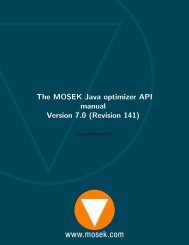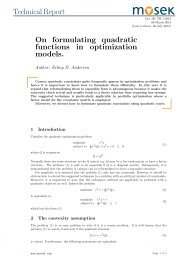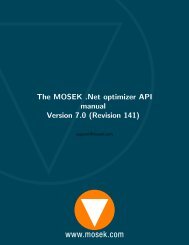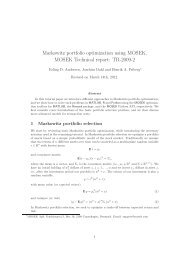- Page 1 and 2:
The MOSEK Python optimizer API manu
- Page 3 and 4:
Contents 1 Changes and new features
- Page 5 and 6:
CONTENTS v 8 A case study 97 8.1 Po
- Page 7 and 8:
CONTENTS vii 14.2.1 Caveats . . . .
- Page 9 and 10:
CONTENTS ix A.2.70 Task.getdviolvar
- Page 11 and 12:
CONTENTS xi A.2.162Task.isdouparnam
- Page 13 and 14:
CONTENTS xiii A.2.254Task.readparam
- Page 15 and 16:
CONTENTS xv B.1.45 dparam.mio near
- Page 17 and 18:
CONTENTS xvii B.2.68 iparam.log sim
- Page 19 and 20:
CONTENTS xix B.2.160iparam.sim refa
- Page 21 and 22:
CONTENTS xxi D.18 Long integer info
- Page 23 and 24:
Contact information Phone +45 3917
- Page 25 and 26:
License agreement Before using the
- Page 27 and 28:
Chapter 1 Changes and new features
- Page 29 and 30:
1.4. API CHANGES 7 1.3.3 Mixed-inte
- Page 31 and 32:
1.10. SUMMARY OF API CHANGES 9 •
- Page 33 and 34:
1.10. SUMMARY OF API CHANGES 11 •
- Page 35 and 36:
1.10. SUMMARY OF API CHANGES 13 •
- Page 37 and 38:
Chapter 2 About this manual This ma
- Page 39 and 40:
Chapter 3 Getting support and help
- Page 41 and 42:
Chapter 4 Testing installation and
- Page 43 and 44:
Chapter 5 Basic API tutorial In thi
- Page 45 and 46:
5.1. THE BASICS 23 5 # 6 # Purpose:
- Page 47 and 48:
5.2. LINEAR OPTIMIZATION 25 and the
- Page 49 and 50:
5.2. LINEAR OPTIMIZATION 27 Load a
- Page 51 and 52:
5.2. LINEAR OPTIMIZATION 29 Optimiz
- Page 53 and 54:
5.2. LINEAR OPTIMIZATION 31 88 task
- Page 55 and 56:
5.2. LINEAR OPTIMIZATION 33 51 mose
- Page 57 and 58:
5.3. CONIC QUADRATIC OPTIMIZATION 3
- Page 59 and 60:
5.3. CONIC QUADRATIC OPTIMIZATION 3
- Page 61 and 62:
5.4. SEMIDEFINITE OPTIMIZATION 39 m
- Page 63 and 64:
5.4. SEMIDEFINITE OPTIMIZATION 41 4
- Page 65 and 66:
5.4. SEMIDEFINITE OPTIMIZATION 43 1
- Page 67 and 68:
5.5. QUADRATIC OPTIMIZATION 45 with
- Page 69 and 70:
5.5. QUADRATIC OPTIMIZATION 47 68 #
- Page 71 and 72:
5.5. QUADRATIC OPTIMIZATION 49 5.5.
- Page 73 and 74:
5.5. QUADRATIC OPTIMIZATION 51 81 a
- Page 75 and 76:
5.6. THE SOLUTION SUMMARY 53 • Th
- Page 77 and 78:
5.7. INTEGER OPTIMIZATION 55 21 # f
- Page 79 and 80:
5.7. INTEGER OPTIMIZATION 57 137 sy
- Page 81 and 82:
5.8. THE SOLUTION SUMMARY FOR MIXED
- Page 83 and 84:
5.9. RESPONSE HANDLING 61 Note that
- Page 85 and 86:
5.10. PROBLEM MODIFICATION AND REOP
- Page 87 and 88:
5.10. PROBLEM MODIFICATION AND REOP
- Page 89 and 90:
5.11. SOLUTION ANALYSIS 67 151 # Pu
- Page 91 and 92:
5.13. CONVENTIONS EMPLOYED IN THE A
- Page 93 and 94:
5.13. CONVENTIONS EMPLOYED IN THE A
- Page 95 and 96:
5.13. CONVENTIONS EMPLOYED IN THE A
- Page 97 and 98:
5.13. CONVENTIONS EMPLOYED IN THE A
- Page 99 and 100:
Chapter 6 Nonlinear API tutorial Th
- Page 101 and 102:
6.1. SEPARABLE CONVEX (SCOPT) INTER
- Page 103 and 104:
6.1. SEPARABLE CONVEX (SCOPT) INTER
- Page 105 and 106:
6.1. SEPARABLE CONVEX (SCOPT) INTER
- Page 107 and 108:
Chapter 7 Advanced API tutorial Thi
- Page 109 and 110:
7.1. THE PROGRESS CALL-BACK 87 71 p
- Page 111 and 112:
7.2. SOLVING LINEAR SYSTEMS INVOLVI
- Page 113 and 114:
7.2. SOLVING LINEAR SYSTEMS INVOLVI
- Page 115 and 116:
7.2. SOLVING LINEAR SYSTEMS INVOLVI
- Page 117 and 118:
7.2. SOLVING LINEAR SYSTEMS INVOLVI
- Page 119 and 120:
Chapter 8 A case study 8.1 Portfoli
- Page 121 and 122:
8.1. PORTFOLIO OPTIMIZATION 99 e T
- Page 123 and 124:
8.1. PORTFOLIO OPTIMIZATION 101 is
- Page 125 and 126:
8.1. PORTFOLIO OPTIMIZATION 103 15
- Page 127 and 128:
8.1. PORTFOLIO OPTIMIZATION 105 63
- Page 129 and 130:
8.1. PORTFOLIO OPTIMIZATION 107 8.1
- Page 131 and 132:
8.1. PORTFOLIO OPTIMIZATION 109 110
- Page 133 and 134:
8.1. PORTFOLIO OPTIMIZATION 111 z j
- Page 135 and 136:
8.1. PORTFOLIO OPTIMIZATION 113 Var
- Page 137 and 138:
8.1. PORTFOLIO OPTIMIZATION 115 56
- Page 139 and 140:
8.1. PORTFOLIO OPTIMIZATION 117 172
- Page 141 and 142:
Chapter 9 Usage guidelines The purp
- Page 143 and 144:
9.3. WRITING TASK DATA TO A FILE 12
- Page 145 and 146:
Chapter 10 Problem formulation and
- Page 147 and 148:
10.1. LINEAR OPTIMIZATION 125 be a
- Page 149 and 150:
10.2. CONIC QUADRATIC OPTIMIZATION
- Page 151 and 152:
10.2. CONIC QUADRATIC OPTIMIZATION
- Page 153 and 154:
10.3. SEMIDEFINITE OPTIMIZATION 131
- Page 155 and 156:
10.4. QUADRATIC AND QUADRATICALLY C
- Page 157 and 158:
Chapter 11 The optimizers for conti
- Page 159 and 160:
11.1. HOW AN OPTIMIZER WORKS 137 11
- Page 161 and 162:
11.2. LINEAR OPTIMIZATION 139 11.2.
- Page 163 and 164:
11.2. LINEAR OPTIMIZATION 141 Whene
- Page 165 and 166:
11.2. LINEAR OPTIMIZATION 143 11.2.
- Page 167 and 168:
11.2. LINEAR OPTIMIZATION 145 • R
- Page 169 and 170:
11.5. NONLINEAR CONVEX OPTIMIZATION
- Page 171 and 172:
11.6. SOLVING PROBLEMS IN PARALLEL
- Page 173 and 174:
11.6. SOLVING PROBLEMS IN PARALLEL
- Page 175 and 176:
11.6. SOLVING PROBLEMS IN PARALLEL
- Page 177 and 178:
Chapter 12 The optimizers for mixed
- Page 179 and 180:
12.3. THE MIXED-INTEGER CONIC OPTIM
- Page 181 and 182:
12.5. TERMINATION CRITERION 159 •
- Page 183 and 184:
12.7. UNDERSTANDING SOLUTION QUALIT
- Page 185 and 186:
Chapter 13 The analyzers 13.1 The p
- Page 187 and 188:
13.1. THE PROBLEM ANALYZER 165 Cons
- Page 189 and 190:
13.2. ANALYZING INFEASIBLE PROBLEMS
- Page 191 and 192:
13.2. ANALYZING INFEASIBLE PROBLEMS
- Page 193 and 194:
13.2. ANALYZING INFEASIBLE PROBLEMS
- Page 195 and 196: 13.2. ANALYZING INFEASIBLE PROBLEMS
- Page 197 and 198: 13.2. ANALYZING INFEASIBLE PROBLEMS
- Page 199 and 200: Chapter 14 Primal feasibility repai
- Page 201 and 202: 14.2. AUTOMATIC REPAIR 179 One way
- Page 203 and 204: 14.3. FEASIBILITY REPAIR IN MOSEK 1
- Page 205 and 206: 14.3. FEASIBILITY REPAIR IN MOSEK 1
- Page 207 and 208: Chapter 15 Sensitivity analysis 15.
- Page 209 and 210: 15.4. SENSITIVITY ANALYSIS FOR LINE
- Page 211 and 212: 15.4. SENSITIVITY ANALYSIS FOR LINE
- Page 213 and 214: 15.4. SENSITIVITY ANALYSIS FOR LINE
- Page 215 and 216: 15.5. SENSITIVITY ANALYSIS FROM THE
- Page 217 and 218: 15.6. SENSITIVITY ANALYSIS WITH THE
- Page 219 and 220: 15.6. SENSITIVITY ANALYSIS WITH THE
- Page 221 and 222: Appendix A API reference This chapt
- Page 223 and 224: 201 • Task.relaxprimal Obtain inf
- Page 225 and 226: A.1. EXCEPTIONS 203 • Task.putvar
- Page 227 and 228: A.2. CLASS TASK 205 Arguments which
- Page 229 and 230: A.2. CLASS TASK 207 See also • Ro
- Page 231 and 232: A.2. CLASS TASK 209 Description: Ap
- Page 233 and 234: A.2. CLASS TASK 211 Description: If
- Page 235 and 236: A.2. CLASS TASK 213 A.2.16 Task.com
- Page 237 and 238: A.2. CLASS TASK 215 subj : int[] In
- Page 239 and 240: A.2. CLASS TASK 217 firsti : int In
- Page 241 and 242: A.2. CLASS TASK 219 A.2.27 Task.get
- Page 243 and 244: A.2. CLASS TASK 221 valijkl : Descr
- Page 245: A.2. CLASS TASK 223 A.2.33 Task.get
- Page 249 and 250: A.2. CLASS TASK 227 A.2.41 Task.get
- Page 251 and 252: A.2. CLASS TASK 229 i : int Index o
- Page 253 and 254: A.2. CLASS TASK 231 A.2.49 Task.get
- Page 255 and 256: A.2. CLASS TASK 233 conetype : cone
- Page 257 and 258: A.2. CLASS TASK 235 Description: Ob
- Page 259 and 260: A.2. CLASS TASK 237 sub : int[] Ind
- Page 261 and 262: A.2. CLASS TASK 239 A.2.64 Task.get
- Page 263 and 264: A.2. CLASS TASK 241 Computes the vi
- Page 265 and 266: A.2. CLASS TASK 243 A.2.71 Task.get
- Page 267 and 268: A.2. CLASS TASK 245 A.2.75 Task.get
- Page 269 and 270: A.2. CLASS TASK 247 A.2.80 Task.get
- Page 271 and 272: A.2. CLASS TASK 249 A.2.86 Task.get
- Page 273 and 274: A.2. CLASS TASK 251 A.2.92 Task.get
- Page 275 and 276: A.2. CLASS TASK 253 k : int Index o
- Page 277 and 278: A.2. CLASS TASK 255 A.2.103 Task.ge
- Page 279 and 280: A.2. CLASS TASK 257 normalize : int
- Page 281 and 282: A.2. CLASS TASK 259 Description: Le
- Page 283 and 284: A.2. CLASS TASK 261 max(l x j τ
- Page 285 and 286: A.2. CLASS TASK 263 A.2.117 Task.ge
- Page 287 and 288: A.2. CLASS TASK 265 last : int Last
- Page 289 and 290: A.2. CLASS TASK 267 A.2.124 Task.ge
- Page 291 and 292: A.2. CLASS TASK 269 Arguments snx :
- Page 293 and 294: A.2. CLASS TASK 271 slc : double[]
- Page 295 and 296: A.2. CLASS TASK 273 Arguments accmo
- Page 297 and 298:
A.2. CLASS TASK 275 A.2.133 Task.ge
- Page 299 and 300:
A.2. CLASS TASK 277 last : int Valu
- Page 301 and 302:
A.2. CLASS TASK 279 subi : int[] Ro
- Page 303 and 304:
A.2. CLASS TASK 281 Description: Ob
- Page 305 and 306:
A.2. CLASS TASK 283 Arguments taskn
- Page 307 and 308:
A.2. CLASS TASK 285 A.2.148 Task.ge
- Page 309 and 310:
A.2. CLASS TASK 287 vartype : varia
- Page 311 and 312:
A.2. CLASS TASK 289 whichsol : solt
- Page 313 and 314:
A.2. CLASS TASK 291 Description: Ob
- Page 315 and 316:
A.2. CLASS TASK 293 A.2.162 Task.is
- Page 317 and 318:
A.2. CLASS TASK 295 whichstream : s
- Page 319 and 320:
A.2. CLASS TASK 297 A.2.170 Task.pr
- Page 321 and 322:
A.2. CLASS TASK 299 markj : mark Th
- Page 323 and 324:
A.2. CLASS TASK 301 Prints a part o
- Page 325 and 326:
A.2. CLASS TASK 303 A.2.175 Task.pu
- Page 327 and 328:
A.2. CLASS TASK 305 j : int Index o
- Page 329 and 330:
A.2. CLASS TASK 307 A.2.180 Task.pu
- Page 331 and 332:
A.2. CLASS TASK 309 Description: Th
- Page 333 and 334:
A.2. CLASS TASK 311 A.2.186 Task.pu
- Page 335 and 336:
A.2. CLASS TASK 313 Changes the bou
- Page 337 and 338:
A.2. CLASS TASK 315 Modifies one li
- Page 339 and 340:
A.2. CLASS TASK 317 bkc : boundkey
- Page 341 and 342:
A.2. CLASS TASK 319 Arguments j : i
- Page 343 and 344:
A.2. CLASS TASK 321 parvalue : int
- Page 345 and 346:
A.2. CLASS TASK 323 A.2.207 Task.pu
- Page 347 and 348:
A.2. CLASS TASK 325 Sets a string p
- Page 349 and 350:
A.2. CLASS TASK 327 Description: Re
- Page 351 and 352:
A.2. CLASS TASK 329 qosubj : int[]
- Page 353 and 354:
A.2. CLASS TASK 331 Sets the status
- Page 355 and 356:
A.2. CLASS TASK 333 A.2.224 Task.pu
- Page 357 and 358:
A.2. CLASS TASK 335 Arguments sux :
- Page 359 and 360:
A.2. CLASS TASK 337 y : double[] Ve
- Page 361 and 362:
A.2. CLASS TASK 339 A.2.233 Task.pu
- Page 363 and 364:
A.2. CLASS TASK 341 last : int Last
- Page 365 and 366:
A.2. CLASS TASK 343 See also • Ta
- Page 367 and 368:
A.2. CLASS TASK 345 A.2.243 Task.pu
- Page 369 and 370:
A.2. CLASS TASK 347 Description: Se
- Page 371 and 372:
A.2. CLASS TASK 349 Sets a slice of
- Page 373 and 374:
A.2. CLASS TASK 351 A.2.254 Task.re
- Page 375 and 376:
A.2. CLASS TASK 353 wux : double[]
- Page 377 and 378:
A.2. CLASS TASK 355 See also • Ta
- Page 379 and 380:
A.2. CLASS TASK 357 isdef : int Is
- Page 381 and 382:
A.2. CLASS TASK 359 A.2.269 Task.st
- Page 383 and 384:
A.2. CLASS TASK 361 Description: Wr
- Page 385 and 386:
A.3. CLASS ENV 363 A.2.278 Task.wri
- Page 387 and 388:
A.3. CLASS ENV 365 Arguments code :
- Page 389 and 390:
A.3. CLASS ENV 367 Arguments keepdl
- Page 391 and 392:
A.4. CALLBACK FUNCTIONS AND RELATED
- Page 393 and 394:
A.6. ALL FUNCTIONS BY NAME 371 Task
- Page 395 and 396:
A.6. ALL FUNCTIONS BY NAME 373 Task
- Page 397 and 398:
A.6. ALL FUNCTIONS BY NAME 375 Task
- Page 399 and 400:
A.6. ALL FUNCTIONS BY NAME 377 Task
- Page 401 and 402:
A.6. ALL FUNCTIONS BY NAME 379 Task
- Page 403 and 404:
A.6. ALL FUNCTIONS BY NAME 381 Task
- Page 405 and 406:
A.6. ALL FUNCTIONS BY NAME 383 Task
- Page 407 and 408:
A.6. ALL FUNCTIONS BY NAME 385 Task
- Page 409 and 410:
A.6. ALL FUNCTIONS BY NAME 387 Task
- Page 411 and 412:
Appendix B Parameters Parameters gr
- Page 413 and 414:
391 • iparam.log file. If turned
- Page 415 and 416:
393 • dparam.intpnt nl tol rel st
- Page 417 and 418:
395 • iparam.mio construct sol. C
- Page 419 and 420:
397 • dparam.intpnt nl tol mu red
- Page 421 and 422:
399 • iparam.mio mode. Turns on/o
- Page 423 and 424:
401 • iparam.sim solve form. Cont
- Page 425 and 426:
B.1. DPARAM: DOUBLE PARAMETERS 403
- Page 427 and 428:
B.1. DPARAM: DOUBLE PARAMETERS 405
- Page 429 and 430:
B.1. DPARAM: DOUBLE PARAMETERS 407
- Page 431 and 432:
B.1. DPARAM: DOUBLE PARAMETERS 409
- Page 433 and 434:
B.1. DPARAM: DOUBLE PARAMETERS 411
- Page 435 and 436:
B.1. DPARAM: DOUBLE PARAMETERS 413
- Page 437 and 438:
B.1. DPARAM: DOUBLE PARAMETERS 415
- Page 439 and 440:
B.1. DPARAM: DOUBLE PARAMETERS 417
- Page 441 and 442:
B.1. DPARAM: DOUBLE PARAMETERS 419
- Page 443 and 444:
B.1. DPARAM: DOUBLE PARAMETERS 421
- Page 445 and 446:
B.1. DPARAM: DOUBLE PARAMETERS 423
- Page 447 and 448:
B.1. DPARAM: DOUBLE PARAMETERS 425
- Page 449 and 450:
B.2. IPARAM: INTEGER PARAMETERS 427
- Page 451 and 452:
B.2. IPARAM: INTEGER PARAMETERS 429
- Page 453 and 454:
B.2. IPARAM: INTEGER PARAMETERS 431
- Page 455 and 456:
B.2. IPARAM: INTEGER PARAMETERS 433
- Page 457 and 458:
B.2. IPARAM: INTEGER PARAMETERS 435
- Page 459 and 460:
B.2. IPARAM: INTEGER PARAMETERS 437
- Page 461 and 462:
B.2. IPARAM: INTEGER PARAMETERS 439
- Page 463 and 464:
B.2. IPARAM: INTEGER PARAMETERS 441
- Page 465 and 466:
B.2. IPARAM: INTEGER PARAMETERS 443
- Page 467 and 468:
B.2. IPARAM: INTEGER PARAMETERS 445
- Page 469 and 470:
B.2. IPARAM: INTEGER PARAMETERS 447
- Page 471 and 472:
B.2. IPARAM: INTEGER PARAMETERS 449
- Page 473 and 474:
B.2. IPARAM: INTEGER PARAMETERS 451
- Page 475 and 476:
B.2. IPARAM: INTEGER PARAMETERS 453
- Page 477 and 478:
B.2. IPARAM: INTEGER PARAMETERS 455
- Page 479 and 480:
B.2. IPARAM: INTEGER PARAMETERS 457
- Page 481 and 482:
B.2. IPARAM: INTEGER PARAMETERS 459
- Page 483 and 484:
B.2. IPARAM: INTEGER PARAMETERS 461
- Page 485 and 486:
B.2. IPARAM: INTEGER PARAMETERS 463
- Page 487 and 488:
B.2. IPARAM: INTEGER PARAMETERS 465
- Page 489 and 490:
B.2. IPARAM: INTEGER PARAMETERS 467
- Page 491 and 492:
B.2. IPARAM: INTEGER PARAMETERS 469
- Page 493 and 494:
B.2. IPARAM: INTEGER PARAMETERS 471
- Page 495 and 496:
B.2. IPARAM: INTEGER PARAMETERS 473
- Page 497 and 498:
B.2. IPARAM: INTEGER PARAMETERS 475
- Page 499 and 500:
B.2. IPARAM: INTEGER PARAMETERS 477
- Page 501 and 502:
B.2. IPARAM: INTEGER PARAMETERS 479
- Page 503 and 504:
B.2. IPARAM: INTEGER PARAMETERS 481
- Page 505 and 506:
B.2. IPARAM: INTEGER PARAMETERS 483
- Page 507 and 508:
B.2. IPARAM: INTEGER PARAMETERS 485
- Page 509 and 510:
B.2. IPARAM: INTEGER PARAMETERS 487
- Page 511 and 512:
B.2. IPARAM: INTEGER PARAMETERS 489
- Page 513 and 514:
B.2. IPARAM: INTEGER PARAMETERS 491
- Page 515 and 516:
B.2. IPARAM: INTEGER PARAMETERS 493
- Page 517 and 518:
B.2. IPARAM: INTEGER PARAMETERS 495
- Page 519 and 520:
B.2. IPARAM: INTEGER PARAMETERS 497
- Page 521 and 522:
B.2. IPARAM: INTEGER PARAMETERS 499
- Page 523 and 524:
B.2. IPARAM: INTEGER PARAMETERS 501
- Page 525 and 526:
B.2. IPARAM: INTEGER PARAMETERS 503
- Page 527 and 528:
B.3. SPARAM: STRING PARAMETER TYPES
- Page 529 and 530:
B.3. SPARAM: STRING PARAMETER TYPES
- Page 531 and 532:
B.3. SPARAM: STRING PARAMETER TYPES
- Page 533 and 534:
B.3. SPARAM: STRING PARAMETER TYPES
- Page 535 and 536:
B.3. SPARAM: STRING PARAMETER TYPES
- Page 537 and 538:
Appendix C Response codes Response
- Page 539 and 540:
517 rescode.err con q not psd The q
- Page 541 and 542:
519 rescode.err global inv conic pr
- Page 543 and 544:
521 rescode.err inv markj Invalid v
- Page 545 and 546:
523 rescode.err invalid format type
- Page 547 and 548:
525 rescode.err license no server s
- Page 549 and 550:
527 rescode.err mio no optimizer No
- Page 551 and 552:
529 rescode.err name max len A name
- Page 553 and 554:
531 rescode.err numconlim Maximum n
- Page 555 and 556:
533 rescode.err qcon upper triangle
- Page 557 and 558:
535 rescode.err sym mat invalid col
- Page 559 and 560:
537 rescode.err user nlo func The u
- Page 561 and 562:
539 rescode.wrn ana almost int boun
- Page 563 and 564:
541 rescode.wrn mio infeasible fina
- Page 565 and 566:
543 rescode.wrn write discarded cfi
- Page 567 and 568:
Appendix D API constants D.1 Constr
- Page 569 and 570:
D.5. PROGRESS CALL-BACK CODES 547 c
- Page 571 and 572:
D.5. PROGRESS CALL-BACK CODES 549 c
- Page 573 and 574:
D.5. PROGRESS CALL-BACK CODES 551 c
- Page 575 and 576:
D.5. PROGRESS CALL-BACK CODES 553 c
- Page 577 and 578:
D.6. TYPES OF CONVEXITY CHECKS. 555
- Page 579 and 580:
D.10. DOUBLE INFORMATION ITEMS 557
- Page 581 and 582:
D.10. DOUBLE INFORMATION ITEMS 559
- Page 583 and 584:
D.11. FEASIBILITY REPAIR TYPES 561
- Page 585 and 586:
D.13. INTEGER INFORMATION ITEMS. 56
- Page 587 and 588:
D.13. INTEGER INFORMATION ITEMS. 56
- Page 589 and 590:
D.13. INTEGER INFORMATION ITEMS. 56
- Page 591 and 592:
D.16. INPUT/OUTPUT MODES 569 intpnt
- Page 593 and 594:
D.20. CONTINUOUS MIXED-INTEGER SOLU
- Page 595 and 596:
D.26. OBJECTIVE SENSE TYPES 573 D.2
- Page 597 and 598:
D.31. PRESOLVE METHOD. 575 paramete
- Page 599 and 600:
D.35. RESPONSE CODE TYPE 577 D.35 R
- Page 601 and 602:
D.42. PROBLEM REFORMULATION. 579 si
- Page 603 and 604:
D.46. SOLUTION TYPES 581 solsta.dua
- Page 605 and 606:
D.50. STREAM TYPES 583 startpointty
- Page 607 and 608:
Appendix E Troubleshooting When cre
- Page 609 and 610:
Appendix F Mosek file formats MOSEK
- Page 611 and 612:
F.1. THE MPS FILE FORMAT 589 Fields
- Page 613 and 614:
F.1. THE MPS FILE FORMAT 591 must b
- Page 615 and 616:
F.1. THE MPS FILE FORMAT 593 Constr
- Page 617 and 618:
F.1. THE MPS FILE FORMAT 595 v 1 is
- Page 619 and 620:
F.1. THE MPS FILE FORMAT 597 Please
- Page 621 and 622:
F.2. THE LP FILE FORMAT 599 minimiz
- Page 623 and 624:
F.2. THE LP FILE FORMAT 601 st defi
- Page 625 and 626:
F.2. THE LP FILE FORMAT 603 bounds
- Page 627 and 628:
F.3. THE OPF FORMAT 605 iparam.writ
- Page 629 and 630:
F.3. THE OPF FORMAT 607 [tag "value
- Page 631 and 632:
F.3. THE OPF FORMAT 609 Note that a
- Page 633 and 634:
F.3. THE OPF FORMAT 611 F.3.2.3 Nam
- Page 635 and 636:
F.3. THE OPF FORMAT 613 [bounds] [b
- Page 637 and 638:
F.4. THE TASK FORMAT 615 This can b
- Page 639 and 640:
F.7. THE SOLUTION FILE FORMAT 617 c
- Page 641 and 642:
Appendix G Problem analyzer example
- Page 643 and 644:
G.2. ARKI001 621 2 476 45.42 48.19
- Page 645 and 646:
G.4. PROBLEM WITH BOTH LINEAR AND C
- Page 647 and 648:
Bibliography [1] Chvátal, V.. Line
- Page 649 and 650:
Index analyzenames (Task method), 2
- Page 651 and 652:
INDEX 629 getpcni (Task method), 25
- Page 653 and 654:
INDEX 631 putbarablocktriplet (Task
- Page 655 and 656:
INDEX 633 rescode.err inv numj, 521
- Page 657 and 658:
INDEX 635 rescode.err sen bound inv








